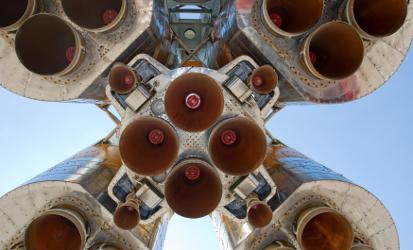Smarter manufacturing for space applications

An OU academic is building on the OU’s track record in stress engineering to develop future smart manufacturing processes for space applications.
Dr Richard Moat, Senior Lecturer, in the OU’s Faculty of Science, Technology, Engineering and Mathematics, is collaborating with Oxfordshire-based SME, Stress-Space Limited on the national SPRINT (SPace Research and Innovation Network for Technology) business support programme to collaborate on a project to measure residual stresses at the surface of additive manufactured components.
The SPRINT project will develop an X-ray diffraction measurement system to deliver the high-quality residual stress data required to develop future smart manufacturing processes for space applications.
It will tackle the challenges of material grain size, material microstructure (specifically its crystallographic texture) and surface effects. This will help space design and manufacturing engineers to prevent fatigue failures and meet stringent fracture control requirements, for example, during the loading phase of hazardous spacecraft propellant tanks.
The OU team will bring a strong track record in residual stress engineering research and development, including advanced measurement technologies, modelling and structural integrity assessment.
The project will be funded by a grant from the £4.8 million SPRINT programme that provides unprecedented access to university space expertise and facilities. SPRINT helps businesses through the commercial exploitation of space data and technologies.
Dr Moat said: “As a process, using x-ray diffraction to test residual stress is established, but requires assumptions and is based on the material being ’perfect’. Stress-Space want to measure additive manufactured materials which are far from perfect and will be working with the University to work out the limitations and anything that can be changed in the process to make it work more accurately.
“We will be adding a layer of validity to their technique to provide organisations who have invested heavily in components with greater confidence. The project will also develop an X-ray diffraction simulation model that can be run in future applications.”
John Bouchard, Director of Stress-Space commented:
“As a small company, we needed help to strengthen our product and the University, with their deep knowledge of materials, additive manufacturing and X-ray technology can help us to address these challenges. They also understand the needs of industry and the importance of delivering convincing validation for our product.”
Quarterly Review of Research
Read our Quarterly Review of Research to learn about our latest quality academic output.

Contact our news team
For all out of hours enquiries, please telephone +44 (0)7901 515891
